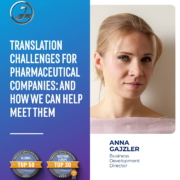Translation Challenges for Pharmaceutical Companies: and How We Can Help Meet Them
Pharmaceutical companies face numerous translation challenges, especially when it comes to translating medical and scientific documents. They must comply with the various regulatory requirements across different countries for clinical trials, marketing authorization applications, and product labeling.
One significant challenge in the current landscape is ensuring the accurate translation of drug labels.
At Janus Worldwide, we are aware of several key challenges in pharmaceutical translation. These include:
- Submission delays: The submission of translated content is subject to extremely tight timelines.
- Readability issues: Readability is one of the factors that creates daily challenges for customers. For instance, patients who may have to take multiple medications daily must read, interpret, and consider multiple pharmaceutical packages concurrently.
- Language errors and poor-quality translations.
- Outdated QRD templates: All new marketing authorizations must use the updated templates, unless there is a transition period.
- Failure to comply with MedDRA standards.
- Project managers (PMs) unfamiliar with harmonization and back-translation procedures.
- Incorrect formatting.
- Maintaining consistency while adhering to local language and regulatory requirements.
Overcoming these challenges necessitates collaboration between companies and translation agencies to ensure accurate, timely, and compliant translations for global markets.
To address these issues, we have implemented the following guidelines:
- Specialized life science translators. This is of paramount importance in the context of the ever-changing international regulatory process. It is vital to choose a translation vendor with experience in both pharmaceutical regulation and translation to guarantee the accuracy, consistency, and relevance of translations.
- Subject Matter Expert (SME) regulatory review and validation.
- Terminology management and CAT tools as additional tools for linguist teams. This also includes the integration of dedicated term bases, both internal and external.
- A proprietary Linguistic Quality Assessment (LQA) process. Our in-house LQA encompasses Analytical, Adequacy, and Fluency aspects. Further details can be found here.
- Ongoing research and utilization of publicly available documentation.
- Dedicated project management teams and experienced PMs in our Life Science department.
Furthermore, our Life Science team employs a proactive approach and maintains a keen awareness of relevant health regulations through:
1. Training on recent and planned regulatory changes
2. Consultations with SMEs
3. Newsletters from regulatory organizations:
4. Participation in medical trade shows in various countries






